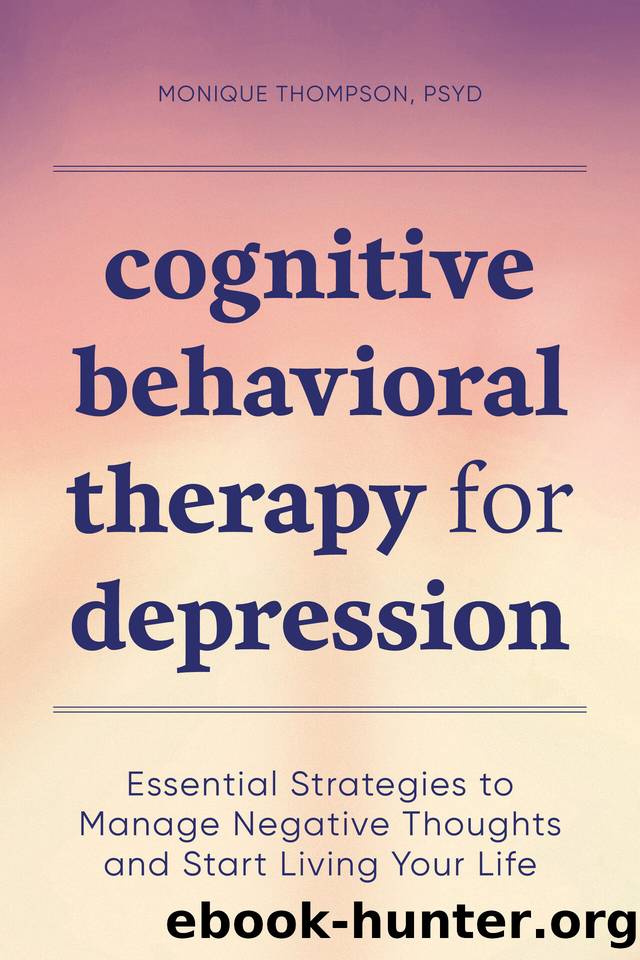Cognitive Behavioral Therapy for Depression: Essential Strategies to Manage Negative Thoughts and Start Living Your Life by Thompson PsyD Monique

Author:Thompson PsyD, Monique [Thompson PsyD, Monique]
Language: eng
Format: epub
Publisher: Rockridge Press
Published: 2020-10-20T16:00:00+00:00
STOP is a strategy that helps you respond rather than react to a difficult emotional experience. This simple practice allows you to pause, take a breath, and observe the situation and what you are feeling before you proceed with your more measured response (Drucker 1954).
S â Stop rather than react
T â Take a breath
O â Observe the situation as it is without judgment
P â Proceed with a response you choose
Can you think about a situation in which you reacted rather than responded? Maybe it was on your drive to work when you honked your horn and yelled at the person that cut in front of you at the tollbooth. What might have been different if you had used the STOP technique? Maybe you would have stopped, taken a breath, noticed that the person was actually human just like you and anxious to get to work, or maybe having a bad day, and rather than honking simply allowed them to enter your lane to the tollbooth.
Think back to something that happened recently or in your past that caused you significant distress, or a situation in which you reacted to the experience in an intense or negative way. Maybe a moment when you snapped at a loved one or overreacted to a situation.
What was the situation? (who, what, where, when)
How did you respond?Was this an avoidance response?
How did the experience turn out?
What might have been different if you had used the STOP technique before your reaction?
S â Stop rather than react
T â Take a breath
O â Observe the situation as it is without judgment
P â Proceed with a response you choose
What would responding rather than reacting change about these kinds of situations?
Try to use the STOP technique in your daily life. It can be helpful to notice the clues that might let you know that you are about to react rather than respond to a situation. Some people notice that when they are in a reactive state, their heart races, or they clench their jaw, or their face flushes. Try to notice when you are getting clues that you are in a situation where you could choose to STOP rather than react in ways that you may regret later. The more we practice these skills, the more they start to become second nature.
Why It Works: There are many reasons why this practice works so well. Research shows that when we step back from a situation for just a few seconds, we are able to broaden our perspectives and proceed with greater clarity. Taking a breath allows our minds and bodies to shift from reaction mode to a calmer state that will allow us to respond rather than react.
Key Takeaways
⢠The reason most people seek out psychological help or treatment is because they want to get rid of unwanted, distressing feelings.
⢠When we are depressed, we often experience emotions such as sadness, hopelessness, irritability, guilt, and shame.
⢠We spend a lot of our time and energy trying to avoid negative emotions and maintain positive emotions.
Download
This site does not store any files on its server. We only index and link to content provided by other sites. Please contact the content providers to delete copyright contents if any and email us, we'll remove relevant links or contents immediately.
Overcoming Worry and Generalised Anxiety Disorder by Mark Freeston(305)
Pocket Therapy for Stress by Claire Michaels Wheeler(281)
EFT and Tapping for Beginners: The Essential EFT Manual to Start Relieving Stress, Losing Weight, and Healing by Rockridge Press(268)
Health And Fitness Tips That Will Change Your Life: Create a healthy lifestyle from beginner to winner with mind-set, diet and exercise habits (Home Workout & Weight Loss Success Book 2) by James Atkinson(267)
Health Promotion by unknow(266)
Evernote: How to Master Evernote in 1 Hour & Getting Things Done Without Forgetting. ( An Essential Underground Guide To GTD In 7 Days Revealed! ) by Jason Scotts(246)
